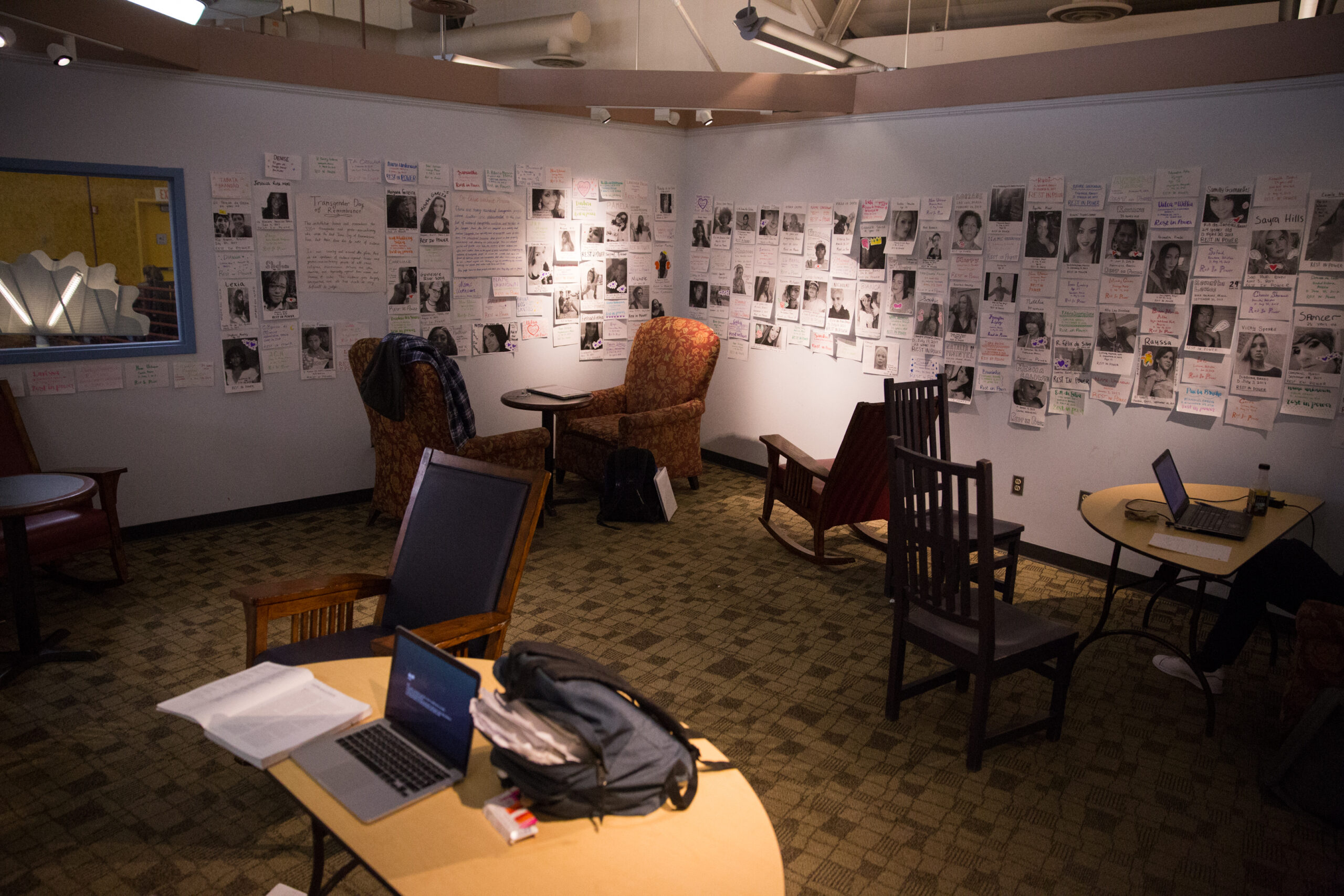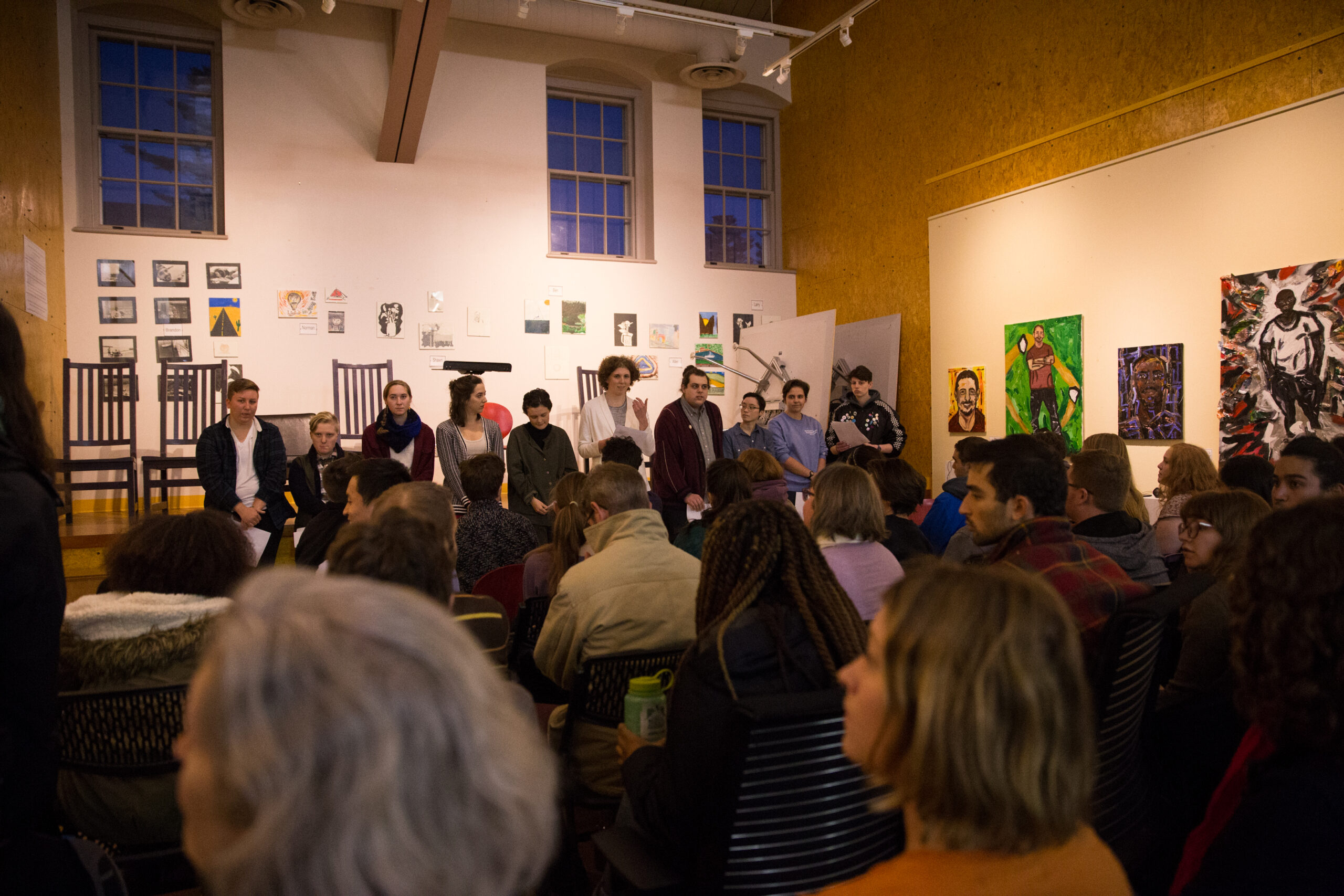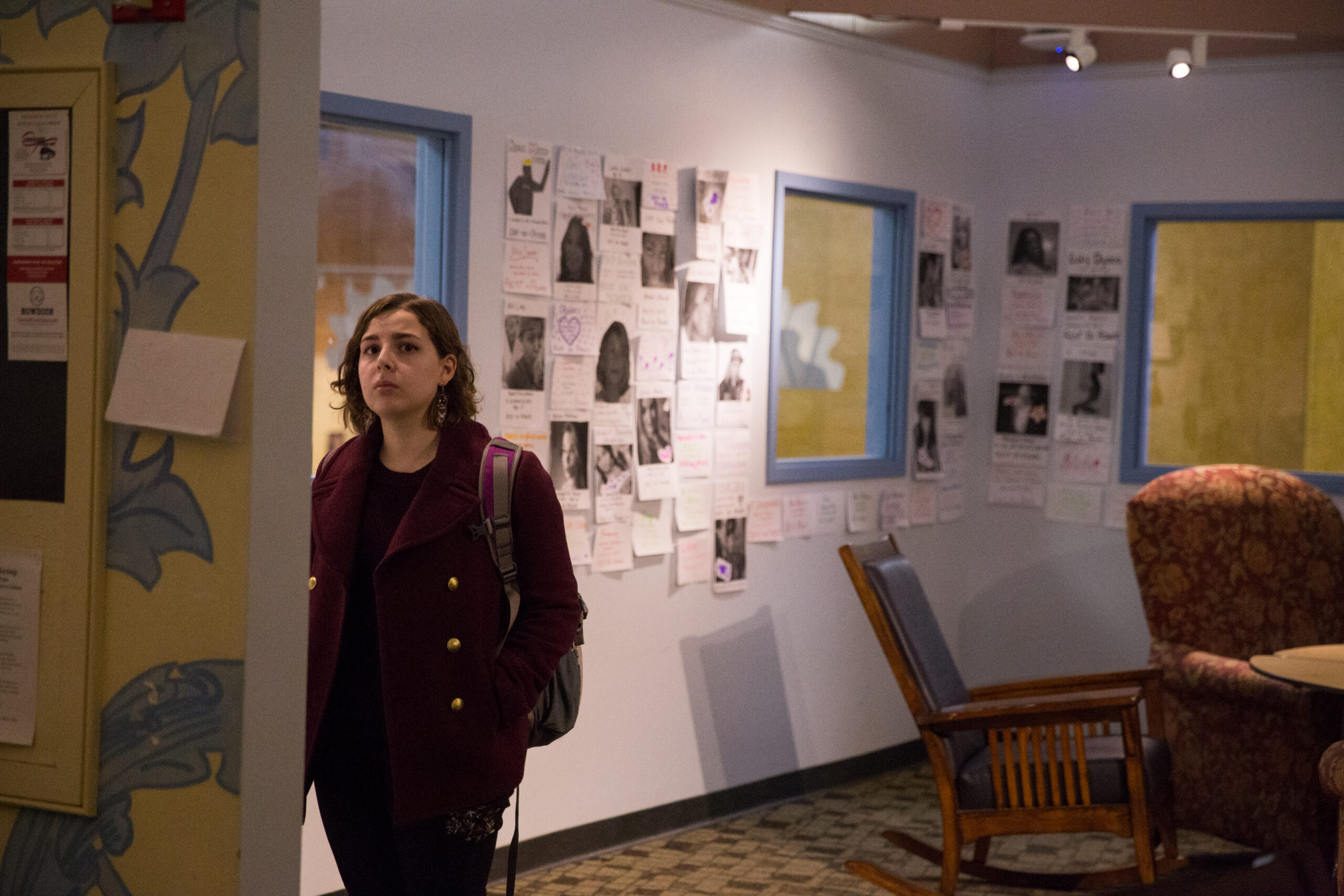Trans Day of Remembrance honors 326 lives lost worldwide
December 1, 2017
Editor’s note: At their request, the names of some individuals interviewed in this piece have been abbreviated to protect their identity.
 Ann Basu
Ann BasuThe walls of the blue box gallery in David Saul Smith Union currently display a memorial to the 326 people killed by acts of anti-trans hatred in the preceding 365 days worldwide. In the days leading up to Transgender Day of Remembrance (TDOR) last Monday, Ari Mehrberg ’20, S. M. ’18, Rayne Stone ’18 and S. Pollack ’21 spent countless hours compiling the names and details of each individual person who was killed, finding photos and other details of their lives in order to create the handmade posters that memorialize each person.
“The [most important part of the] event is … recognizing and taking back the personhood of people who have had their humanity denied through violence,” said M.
The same level of care and attention went into the vigil held last Monday evening in the Lamarche Gallery, organized in honor of all the trans lives lost this year.
Students, faculty and staff packed into the small glass box on the edge of Smith Union, many of whom were standing and even more spilling out the door. The event began with a guitar performance by Pollack and a speech from M.
The event was intended as a moment to come together in honor of the lives lost and in recognition of the endemic violence that occurs against trans people in our country and worldwide.
“TDOR is very much a time of solemnity and grieving and honoring the people that we’ve lost,” said Stone. “There is a message of resilience, but it’s not a particularly positive time.”
After the speech and a moment of silence, 10 students took turns reading each of the 326 individuals’ names, ages and locations, which underscored the magnitude of the violence. This was followed by a slam-poetry performance by Maddie Lemal-Brown ’18 and closing words from Mehrberg.
 Ann Basu
Ann BasuThe sheer number of people killed is difficult to comprehend, especially when one considers that there have likely been many more unreported murders of transgender people.
Violence against transgender people has risen in each of the past three years. The Human Rights Campaign reported that, so far in 2017, 27 transgender people have been killed by violent means, greater than the 23 deaths in 2016. Forty percent of trans people in America believe their lives will end prematurely.
A large majority of the victims of anti-trans violence are trans women of color, who are subjected to living at the intersections of racism, transphobia and misogyny. This multi-layered marginalized identity is often coupled with living in impoverished communities that lack confidence in a police force that will effectively address hate-driven violence. Oftentimes, trans women of color are at risk of mistreatment by the police, and there are many cases of trans women of color who file police reports about transphobic attacks, only to get arrested or be subjected to more violence.
The event’s organizers were clear in their intention to expose the violence for what it is: acts of hatred motivated by transphobia. Often, transphobic violence gets reported in ways that obscures this underlying prejudice and instead places blame on trans individuals.
In her speech, M. outlined one way in which this happens.
“Trans women who ‘pass’ are blamed for not disclosing their trans status to their partners, and the ‘trans panic’ defense is often used to protect their assailants,” she said.
“The feelings of shock are not responsible for the death. What’s responsible for the death are feelings of shame—feelings of internalized shame or transphobia related to finding out that you had sex with a trans person,” said Pollack.
Similarly, sex workers, who are being killed with increased frequency, are often blamed for their deaths because of their participation in an illicit industry, despite the fact that they are experiencing overlapping systems of oppression and are often forced to do sex-work for survival.
“Trans people across the world are murdered simply for being trans,” said M. “The stigma of gender non-conformity [is] so strong that even exploring one’s gender presentation so frequently leads to premature death.”
The first ever Transgender Day of Remembrance was held in 1999 by Gwendolyn Ann Smith, a transgender woman, artist and activist, and it was intended to honor Rita Hester, a transgender woman who was murdered the previous year. Since then, the event has been held every year on November 20 and honors the lives of every recorded murder of transgender people worldwide.
The packed audience at TDOR this year reflected the growing and strengthening trans community at Bowdoin.
“It’s not that there weren’t trans people at Bowdoin before—I’m sure there were still a lot of trans people—I [just] feel like fewer people were out, and we hadn’t all found each other yet,” said Mehrberg.
As the community at Bowdoin grows in size and visibility, so do the concerns of out-trans individuals, who have to navigate being representatives of the already small community. Choosing to be visible at Bowdoin, and beyond, often means assuming the burden of advocating for oneself and educating the larger cisgender community. For some, it means living your life with the understanding that you can be the victim of violence or ignorance.

“Having to advocate for yourselves and having to educate people about your identity and your experience in your body and then having to navigate a society that most of the time doesn’t recognize you or see you as you actually are—it takes a lot out of you,” said Stone.
“I navigate Bowdoin with the constant awareness that I am not physically safe in the world at large,” said M.
Last spring, feces was discovered in a newly installed receptacle for menstrual products in a men’s restroom in Smith Union, an act that sent a message of intolerance to transgender students, for whom the addition to the bathroom was meant to foster safer and more inclusive campus spaces.
For the organizers, reflecting on the murders of trans individuals is about acknowledging and condemning the widespread transphobia that motivates those murders.
For M., confronting transphobia is most importantly about accepting trans people.
“[I want] acceptance that someone’s gender can change in their four years here. That trans people can be as beautiful or desirable as cis people. Acceptance that being friends with a trans person doesn’t need to be hard,” she said.
“I would appreciate not just institutional policies changing, but programming and education that provokes thoughtful conversation that helps people improve and be better to trans people at Bowdoin, and I think that a much more holistic approach than any one policy is what’s needed to support us,” M. added.
Correction, December 5th 2017: A previous version of this article misstated who gave closing remarks at the event. They were said by Ari Mehrberg.

Comments
Before submitting a comment, please review our comment policy. Some key points from the policy: